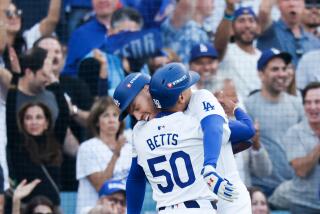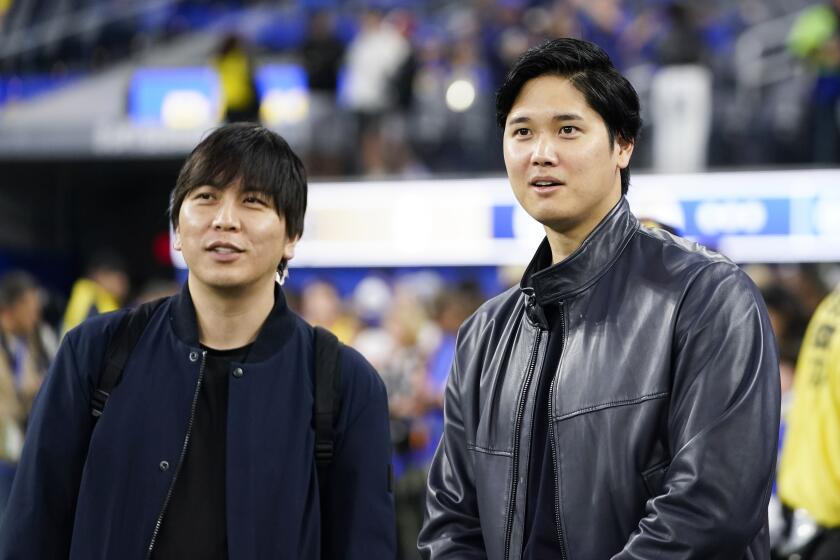Designated for the Right Assignment
TEMPE, Ariz. — He hits off a tee. He shakes his head. He hits in the batting cage. He rides the exercise bike. He hits some more. He runs. He watches video. He twitches.
This is how Brad Fullmer prepares to hit. This is intensity personified.
This is not a warmup routine, a drill or two completed hours before the game starts. This is a menu of routines, from which Fullmer selects several options before each at-bat:
Hit before his first at-bat, watch video and ride the bike before his second at-bat, hit some more before his third.
He cannot sit still. He cannot even stand still. When the Angels are in the field, the one place you won’t find their new designated hitter is on the bench, relaxing and cheering on his teammates.
The Angels ask Fullmer to worry about one thing, and one thing only. He is here to hit. In that role, the Angels believe, he is perfectly cast.
“He’s obsessed with hitting,” Angel General Manager Bill Stoneman said.
“That’s all he thinks about. That’s all he dreams about. The guy loves hitting.”
Stoneman spent a painful amount of time this winter picking up the phone and hearing one agent after another say something along the lines of, “Hi, I represent [insert name of fading veteran slugger here] and we’d love to sign with the Angels.”
No wonder. The Angels might as well have let their pitchers bat for themselves last season.
Their intended designated hitter, Glenallen Hill, hit .136 with one home run in 66 at-bats before they dumped him. By the end of the season, 16 players had started at least one game at DH, sometimes batting ninth. The DH line: a .212 batting average, eight home runs and 56 runs batted in, totals all exceeded by such non-sluggers as Oakland second baseman Frank Menechino and White Sox shortstop Royce Clayton.
So, when agents representing the likes of Dante Bichette, Ron Coomer and Andres Galarraga called, Stoneman kept the names on file, but without much enthusiasm. He would have to do something to add a bat, he knew, but couldn’t he do better?
With Fullmer, 27, he could. And, with the Toronto Blue Jays cutting costs, the Angels could add a hitter just beginning the prime of his career for a modest price. To complete the trade, the Angels simply agreed to give up pitcher Brian Cooper, also 27, who would not have made their team, and pick up Fullmer’s $3.75-million salary.
Fullmer hit .274 with 18 homers and 83 RBIs last season, a relatively disappointing one. In 2000, he hit .295 with 32 homers and 104 RBIs.
For the first time since Chili Davis in 1996, the Angel lineup includes a legitimate designated hitter, and a willing one.
“It’s a specialized spot,” said third-year Manager Mike Scioscia, “and it takes a special mentality to fill it.
“For the first time, we have somebody who wants to do it and who is very productive in that role.”
If a player is good enough to play every day, chances are he detests the DH role. Mo Vaughn, a defensive liability at first base, insisted he would not be the DH. Tim Salmon, forced into DH duty by a foot injury in 1998, all but drove himself nuts.
“For me, it’s a complete feeling after the game when you’re exhausted because you’ve played defense and offense,” Salmon said. “When you’re just a hitter, there’s a tendency to have all this extra energy at the end of the game.”
Salmon’s words ring true to Fullmer. Even after two years as a DH, Fullmer struggles not to drive himself to the brink of mental exhaustion. Without the chance to redeem himself on defense, a DH can go one for three every day and spend sleepless nights dwelling on failing two-thirds of the time.
That’s one reason Fullmer is thrilled to play in Anaheim, why he told his friends at the gym this winter he hoped for a trade to the Angels. He grew up in Chatsworth. His family still lives in Southern California. So does his girlfriend of three years.
When he fails, he will not fail alone, and he will not stay up all night worrying about it.
“I’m the kind of guy that takes it too seriously at times,” he said. “I take it home. I take it away from the ballpark. When you’re away from your family and your friends, you’ve got a lot of empty time. You’ve got a lot of time on your hands to sit there and think. I’m always one to take it home and analyze and over-analyze.
“I think being home will give me a good outlet to leave it at the ballpark--whatever happens, good or bad, let it go. I’ve never had that before.”
When the Expos traded him to Toronto two years ago, Blue Jay Manager Jim Fregosi said Fullmer was “probably meant to be an American League player,” another way of saying, “probably meant to be a DH.”
Not always. The Expos selected him in the second round of the 1993 draft, from Van Nuys Montclair Prep. In 1998, Baseball America ranked him as the Expos’ top prospect, ahead of budding stars Javier Vazquez and Orlando Cabrera.
Fullmer wore a glove--several, in fact--as he made his way to the majors. He signed as a third baseman, sat out an entire year after surgery to repair a torn rotator cuff, tried the outfield, and did not play a full year at first base until his rookie season in Montreal. He worked extensively with Expo coach, Perry Hill, trying to learn the position on the job.
Fullmer played two years at first base for Montreal. He played two games there in two years with Toronto.
“I’m a lot better now, when I don’t play in the field, than I was when I did,” he said. “The first two years, I got labeled as being [terrible] at first, but I had never really played there full-time.
“I continued to work a lot at it in 2000. Last year, I didn’t do as much because I wasn’t playing there. Sometimes, you’ve got to say you’re wasting your time and direct your energy in other ways.
“I think, athletically, I can certainly play in the field. But whatever they need me to do here--I’ve DH’d the last two years, I’m pretty good at it, I’ve had my two best years. So that’s fine. Whatever.”
If intensity and dedication determined defensive prowess, Fullmer would win a Gold Glove. Those are the traits that enabled him to appear as a featured weightlifter in the pages of Muscle and Fitness magazine, after he’d decided in 10th grade to start lifting because he believed he was too thin.
“If we asked him to play the outfield or play shortstop, I’m sure he’d do it,” Stoneman said. “But, by far, his best tool is his bat. He’s happy to contribute that way.”
Fullmer works out with the other first basemen in training camp. He’ll play a few games there this season, mostly in National League ballparks.
But, the more he reflects on Fregosi’s remark, the less it stings.
“I do like the American League,” Fullmer said. “I do think I’m an American League player, because I do like to DH and I want to do it.”
*
Times staff writer Mike DiGiovanna contributed to this story.
More to Read
Go beyond the scoreboard
Get the latest on L.A.'s teams in the daily Sports Report newsletter.
You may occasionally receive promotional content from the Los Angeles Times.







